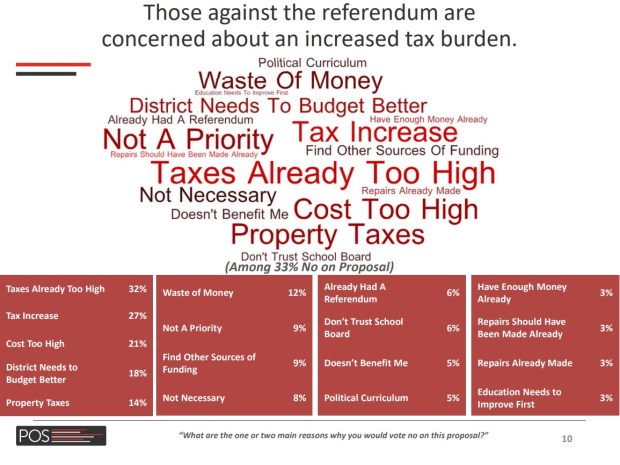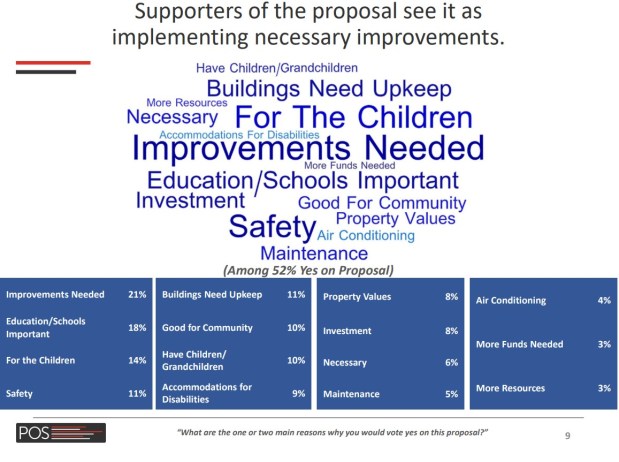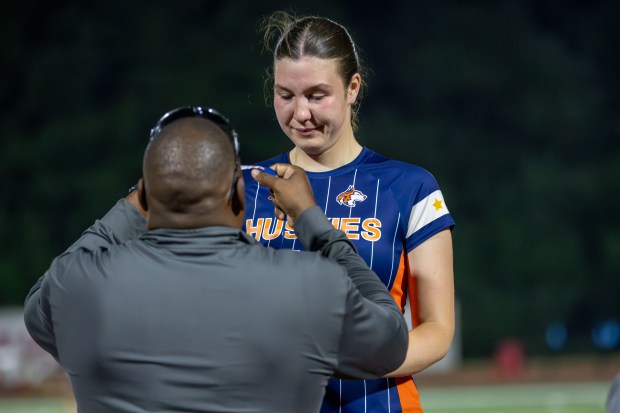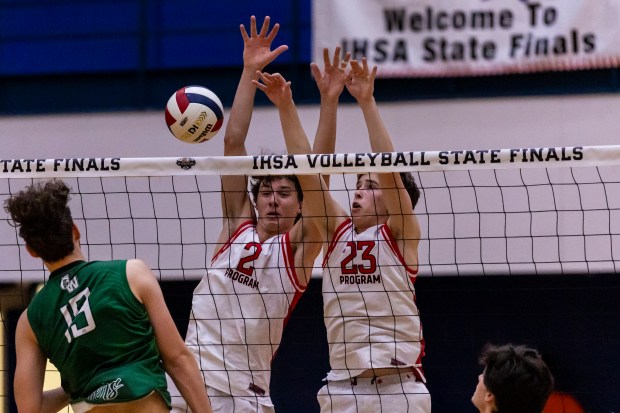A poll conducted by consultants hired by Park Ridge-Niles School District 64 found that a slim majority of voters lean toward supporting a proposed $98.36 million referendum the district is considering. The district would use the funds for repairs and renovations to its schools.
Board of Education members announced they would consider cost alternatives that they hoped would gain more support from voters.
The poll, conducted by Public Opinion Strategies, a consulting firm, asked 200 registered voters in Park Ridge whether they would support or reject a $98.36 million referendum. Of the respondents, 52% of voters indicated some degree of support and 33% said they would definitely or probably oppose it. The poll had a margin of error of 6.93%.
The district is considering whether to place the referendum on the November election ballot.
From April to May, District 64 Superintendent Ben Collins hosted 17 presentations and school building tours to inform community members on why the district is considering going to referendum.
The consultants said in a report that they asked voters the question the same way they would see it on a ballot: “Shall the Board of Education of Park Ridge-Niles Community Consolidated School District Number 64, Cook County, Illinois, alter, repair and equip existing buildings, build and equip additions thereto and improve school sites, including but not limited to improving safety and security; replacing roofs, plumbing, electrical systems, HVAC and air quality systems; updating classrooms and science labs; installing energy efficient improvements; increasing accessibility under the Americans with Disabilities Act; and adding space for special education; issue bonds of said School District to the amount of $98,360,000 for the purpose of paying the costs thereof?”
The poll found that Democrats largely backed renovations to District 64’s schools, with 71% of Democrats saying they supported them and 16% saying they opposed them.
Republicans staunchly opposed renovations, with 57% saying no and 24% saying yes. Younger women and parents with young children were also more favorable of the referendum. The poll found that 43% of voters were less likely to vote for it once they became aware of how much their property taxes would increase to pay for the bonds issued by the school to finance the renovations.
Jim Hobart, a partner at Public Opinion Strategies, said whatever action the board takes, the district will benefit from asking voters to vote on a referendum during a presidential election, because voters will have a higher turnout compared to other elections.
Hobart said it was typical for Democrats to back a referendum like District 64 is proposing and for Republicans to oppose it. “But we typically don’t see this almost 90-point net difference where you have a 55-point net margin with Democrats and a 34-point margin with Republicans. Typically, what we like to say is if you want to feel comfortable about passing a referendum, you want to aim for tying or coming close with Republicans and then Democrats, and to a lesser extent Independents, are able to carry you across the finish line,” he said.
Hobart said the most concerning statistic to him, in terms of voters passing the referendum, was that parents with children in grades K through 12 did not support the referendum, having a “no” majority by three and four points. “(Parents) are not currently seeing the urgency for the repairs in the district, and that would certainly need to be a part of any potential campaign,” Hobart said.
The poll also asked voters open-ended questions on why or why not they supported the potential referendum. Hobart said he saw responses such as “this would increase safety,” “this is for the children,” “good for the community.” Hobart said people who rejected it said things like “taxes are already too high,” “the district should budget better,” and “the cost is too high.”

“Right now in this particular district there is a lot of tax sensitivity. There’s a lot of tax sensitivity in lots of the districts, that (referendum consultant Paul Hanley) and I have polled in so far this year, but this district is where we are seeing the highest degree of it,” Hobart said.
In 2018, Maine Township residents approved a referendum enabling Maine Township High School District 207 to spend $195 million for upgrades to the district’s three high schools. Four years later Park Ridge voters approved a $33.4 million referendum to upgrade the Park Ridge Park District’s ice arena.
Board Member Gareth Kennedy asked Hobart if reducing the scope of the district’s plans for renovations would increase its chances of being approved by voters through referendum. Hobart said it usually does help.
“A good example is LaSalle-Peru (Township) High School District,” Hobart said. “I think they started at $67 million. It was not polling well. I called the superintendent and said, ‘Okay, we should really test this Plan B of yours’… (the referendum decreased to) $36 million or something… and in the end (polls) indicated 50.4% support and at the ballot box we got 50.5% support.”
Board Member Rachel Georgakis pointed out that the board had already tempered their expectations, with the board cutting down an originally proposed referendum that would have cost tax payers $145 million and then chipping it down to $98 million. “I just want us to be mindful of not losing things that could be impactful and important… someone that’s worried about that tax impact is not going to make a difference if we go (from) $98 million to $97 million,” she said.
Superintendent Ben Collins said, “I do think we’ve got a very supportive community. I’m confident in the ways that we can change our messaging and how aggressive we can be, especially with the skills that we have in our school district.”
“If you think the pre-referendum schedule was aggressive, you haven’t seen anything yet… We’re literally going to be everywhere,” Collins said.
Collins said the board can reconsider and prioritize what they want to fund through the referendum. “I think the core of what we have so far is probably going to stay,” he said.
The district will develop different cost alternatives for the 2024 referendum and present them at a Special Board Meeting on July 17 at 6:00 pm in the Hendee Rooms at the Jefferson Early Childhood Center. The board is scheduled to vote at the Aug. 15 meeting on whether or not to put a referendum on the November ballot.





